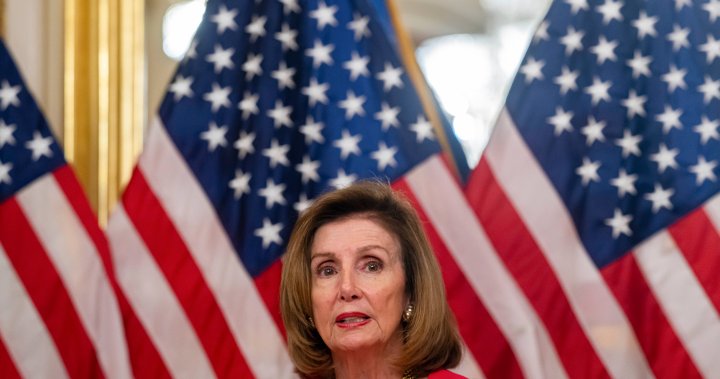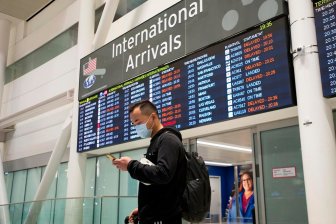China will not be allowed to ‘isolate’ Taiwan, Pelosi says – National | Globalnews.ca
U.S. House Speaker Nancy Pelosi says China will not be permitted to “isolate” Taiwan amid a recent ramp up in Chinese war games in the waters around the self-governing democracy.
At the same time, senior Democrats drew a stark comparison to the invasion of Ukraine, and warned that the U.S. will not change its behaviour in order to avoid drawing Chinese ire.
In a press conference, Pelosi defended her trip to Taiwan earlier this month as one intended to “salute” a thriving democracy and acknowledge a “strong relationship built on the status quo.”
“We will not allow China to isolate Taiwan,” Pelosi told reporters.
Read more:
China lashing out over Pelosi visit, but experts say Taiwanese are ‘thrilled’
Her comments come after Pelosi’s brief stopover prompted an aggressive response by Chinese Communist Party officials who accused the U.S. of “playing with fire.”
In the days since the Aug. 2-3 trip, China announced “live fire exercises” with military drills surrounding the self-governing island. The South China Morning Post called the drills an “effective Taiwan blockade.”
Beijing fired ballistic missiles near the island, and banned the import of hundreds of Taiwanese products.

Democratic Congressman Raja Krishnamoorthi, who represents the eighth district of Illinois, stood alongside Pelosi at the press conference and drew a direct comparison between Chinese claims on Taiwan and Russia’s claims on Ukraine.
“We want to make sure what happened in Ukraine does not happen in the Southeast Asian region, and specifically Taiwan,” said Krishnamoorthi, who serves on the U.S. House of Representatives’ intelligence committee. He added that “any further provocative measures will only hurt the Chinese economy.”
Krishnamoorthi said the U.S. will not be intimidated by Chinese escalation and war games.
“If the cost of avoiding these kinds of provocative measures is to cede control of Taiwan to the People’s Republic of China … that is not a price we are going to pay,” he added.

Though the island is a self-governing democracy, Beijing considers Taiwan a breakaway territory that is part of China.
The split came as a result of a civil war in 1949 when the Communist army of Mao Zedong defeated the Republic of China, and the leaders of the former Republic of China fled from Mainland China to Taiwan.
Last week, Canadian Foreign Affairs Minister Melanie Joly called on China to de-escalate, and said a visit by a legislator should not be a pretext for escalating tensions.
Pelosi’s visit marked the first visit by a U.S. Speaker to Taiwan in 25 years.
It comes at a time when Chinese President Xi Jinping is facing domestic pressures over his handling of the COVID-19 pandemic and the country’s economy, and is set to seek a third term this autumn.
Read more:
Global response to Russia’s invasion should give China ‘pause’ over Taiwan: defence intel chief
Russia’s unprovoked invasion of Ukraine, a sovereign democracy, has sparked concerns among defence and security leaders in the West that China is watching the global response carefully with an eye to a potential move to invade and annex Taiwan.
Maj.-Gen. Michael Wright, the Canadian military’s defence intelligence chief, told the House of Commons defence committee in March that he believed the West’s reaction — which has targeted Russian oligarchs and key institutions like its central bank — has “given China pause.”
“I would say that prior to a week ago, we were very concerned about China and in fact wondering if China would take the opportunity to accelerate their plans for greater control of their near abroad, specifically Taiwan,” Wright said in that March testimony.
“I would hope that with the reaction of the international community, and specifically NATO and the West, that China would have pause for any of their authoritarian plans in the future.”
Canada’s United Nations ambassador, Bob Rae, also drew a direct link between the invasion of Ukraine and the potential for other authoritarian regimes to attempt similar incursions.
“If we’re not able to stop (the Ukraine invasion) in its tracks, I think we know what will happen. It will simply be a licence for others to do the same,” he told Mercedes Stephenson on The West Block in late March.
“So what’s at stake here — it’s not just Ukraine.”
© 2022 Global News, a division of Corus Entertainment Inc.
For all the latest world News Click Here




